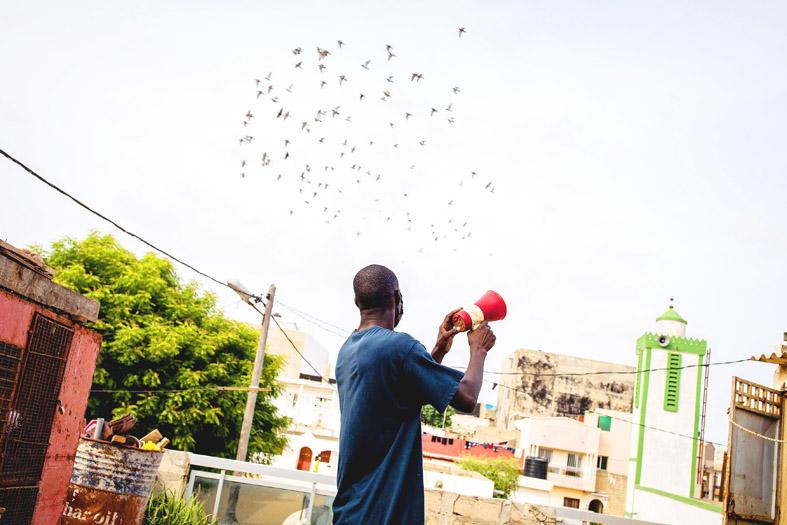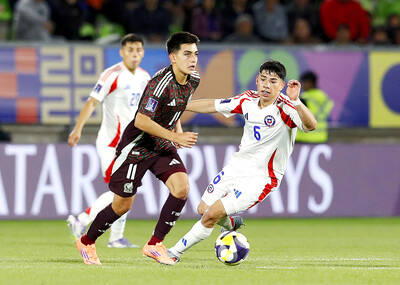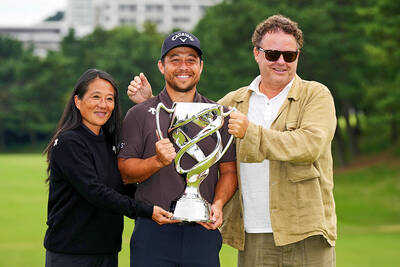Oumar Johnson ducks to enter his cramped dovecote, built atop a city apartment block, and snatches his favorite pigeon from dozens of birds fluttering and cooing around him.
“This pigeon is called Super King,” he said, holding the bird proudly aloft.
The pedigree bird is the most expensive pigeon in Senegal, which Johnson bought at auction to inject a competitive edge into the country’s fledgling pigeon-racing scene.

Photo: AFP
The 30-year-old scientist is one of a small but growing number of Senegalese who have fallen for the charms of breeding and racing homers, some to the point of obsession.
Super King cost the equivalent of about US$800, a hefty price in a country where the minimum wage is about US$110 per month.
“We have a sort of addiction to this animal, the homing pigeon,” said Johnson, the president of the Senegalese Pigeon Fanciers Association. “It’s another way of life.”
Long established in countries such as Belgium, France and China, pigeon racing took off in Senegal only over the past decade, after ornamental bird breeders stumbled across the sport online, Johnson said.
The west African nation now boasts about 350 enthusiasts, many of whom ignore protests from family and loved ones, and devote most of their free time — and sizeable sums of money — to their pigeons.
Most, like Johnson, keep their lovingly tended birds in wooden dovecotes on rooftops in dense urban areas.
From his roof in a suburb of the capital Dakar, 40-year-old shopkeeper Moustapha Gueye releases scores of pigeons from their acrid-smelling loft.
They rush into the air and are quickly out of sight.
“They are athletes, so they need to train,” he said, adding that the pursuit demands time and brainpower.
He not only feeds and exercises the pigeons each morning, but he also handles veterinary care and develops cross-breeds suitable for flying in hot weather.
“It’s something that can’t be explained,” Gueye said, smiling as he describes his feelings when his pigeons return after a long race.
Senegal’s racing season, featuring nation-spanning contests, began in November after the end of the annual rains.
In late October, dozens of mostly young men brought crates of homers to a suburban Dakar rooftop to register them for a pre-season test race — one of several that took place that weekend.
Volunteers registered and tagged the birds in a lively atmosphere, joking and chatting until well after midnight.
Then, convoyeurs drove the tagged pigeons to the city of Diourbel, about 160km east of Dakar, to be released early the next morning.
“It’s like a drug,” said Johnson, who attended the pre-race registration, explaining the sport’s appeal.
The next day, race participant Mamadou Diallo was standing on his Dakar rooftop with several friends, scanning the crystal-blue skies for his pigeons.
The 33-year-old electrical engineer, a self-professed pigeon fanatic, was pacing back and forth in anticipation.
Suddenly a shout went up — pigeons appeared on the horizon.
Diallo, in excitement, skitted around the rooftop blowing a whistle and rattling a plastic bottle to lure the pigeons back into their dovecote.
He carefully noted their arrival times, which the race organizers would later compare with other pigeons that raced from Diourbel.
Afterward, a more relaxed Diallo described pigeons as his passion, but joked that his wife chastises him for wasting his time.
On top of work and family obligations, he fretted about his birds’ welfare.
“It’s normal because ... I put them in a cage,” Diallo said. “I am responsible for them.”
Senegalese pigeon-racing enthusiasts are eager to turn others on to the sport.
Young people are the future of the sport, Johnson said, adding that their devotion would make Senegal “one of the greatest pigeon-racing nations” one day.
“In Europe, you have to motivate young people to get involved,” he said. “Here, young people are rushing into it.”

HOMETOWN ZERO: Fans relished the fall of former Brewer-turned-Cubs manager Craig Counsell, as Milwaukee braces to face the Dodgers, who in 2018 denied them a pennant Milwaukee Brewers manager Pat Murphy has referred to his team as the “Average Joes,” a nod to their small-market status and lack of big names, but after they beat rivals the Chicago Cubs 3-1 in the decisive fifth game of their National League Division Series (NLDS) on Saturday night, Murphy decided it was time for an upgrade. “You can call them the average Joes, but I say they’re the above-average Joes,” he said. The Brewers relied on contributions from just about every player to get past the Cubs. Andrew Vaughn hit a tiebreaking homer in the fourth inning, and William Contreras and Brice

Mexico’s teenage playmaker Gilberto Mora has lit up the FIFA U-20 World Cup in Chile as he basks in the limelight afforded by the absences of Barcelona and Real Madrid stars Lamine Yamal and Franco Mastantuono. “I don’t know if I’m the biggest star, and I’m not really interested in that. I think you can always give more,” 16-year-old Mora said before Mexico’s 4-1 win against host nation Chile in the round-of-16 on Tuesday, in which he provided the assist for the opening goal. Next on Mora’s schedule is a quarter-final clash against Argentina this morning Taiwan time, but after

‘IT’S BASEBALL’: In just the second error to end a post-season series in the MLB, the Phillies reliever fumbled a comebacker and threw to home, despite the signal Eyes red, Orion Kerkering on Thursday received words of support from his Philadelphia Phillies teammates. “Just keep your head up. It’s an honest mistake. Just, it’s baseball,” he remembered hearing. “You’ll be good for a long time to come,” they added. “It’s not my fault, then. We had opportunities to score,” was the message he kept getting. Kerkering made a wild throw past home plate instead of tossing to first after mishandling Andy Pages’ bases-loaded comebacker with two outs in the 11th inning. Pinch-runner Kim Hye-seong scored and the Phillies were eliminated with a 2-1 loss that gave the Los Angeles Dodgers a

It might not have been Xander Schauffele’s most prestigious tournament victory, but it should be the American’s most memorable. Schauffele yesterday shot a seven-under 64 to win the Baycurrent Classic in Japan — a country where his Taiwan-born mother grew up and where he has many connections. Schauffele, who shot 19-under 265 over four rounds at the Yokohama Country Club, finished one shot ahead of American Max Greyserman, who was also the runner-up at the event a year earlier as he chases his first PGA Tour title. When she was four years old, Schauffele’s mother, Chen Ping-yi, moved to Japan, where her Taiwanese